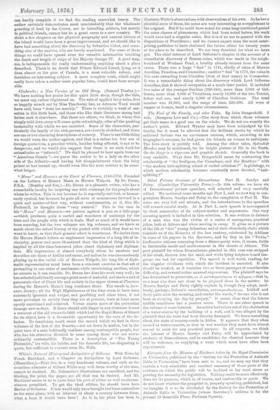"Mann " and Manners at the Court of Florence, 1740 - 1780.
Founded on the Letters of Horace Mann to Horace Walpole. By Dr. Doran, F.S.A. (Bentley and Son.)—Dr. Doran is a pleasant writer, who has a remarkable faculty for inspiring one with contempt for the people about whom he writes. This is not because he is especially satirical, or humor- ously cynical, but because he puts all sorts of meannesses forward in a quiet and matter-of-fact way, without condemnation, as if, like Mr. Pecksniff, he thought them " very natural." This is the case in his "Mann" and Manners—we protest against a pun on a title-page —which produces quite a surfeit and weariness of contempt for the time and the people with which it deals. Half as much of it would have been amusing, but the two volumes are big volumes, and we know as much about the actual history of the period with which they deal as we want to know, so that their general effect is wearisome. We derive from Sir Horace Mann's letters an unpleasant impression of a long life of in- sincerity, graver and more ill-natured than tho kind of thing which is implied by all the time-honoured jokes about diplomacy and diploma- tists. His impressions of almost everybody whom he receives and describes are those of dislike and ennui, and unless he was unconsciously playing up to the social role of Horace Walpole, his long life of diplo- matic representation must have been a constant exorcise in that art of pretending to one order of sentiments while entertaining another, which no success in it can ennoble. Dr. Doran has done his work very well ; he has selected judiciously among a great mass of material, and made a sort of panoramic view of Court life and society in the upper classes at Florence during Sir Horace's Mann's long residence there. The result is; how- ever, dreary ; all the High Mightinesses of the time seem to have been extremely ignorant and vulgar, and gambling and other vices, if not more prevalent in society than they are at present, were at least more openly sanctioned and admired. Virtue exacts more of the proverbial homage now-a-days. If there should still linger in any obstinate breast a remnant of the old romantic faith which had the Royal House of Stuart for its object, here is a favourable opportunity for the cure of the de- lusion. No fanaticism could resist the record which we find in these volumes of the last of the Stuarts,—not set down in malice, but in the quiet tone of a man habitually resident among contemptible people, but who has his attention directed to some among them who are extra- ordinarily contemptible. There is a description of "The Young Pretender," his wife, his habits, and his domestic life, too disgusting to quote, but sufficient to convert even Mr. Wills.


































 Previous page
Previous page